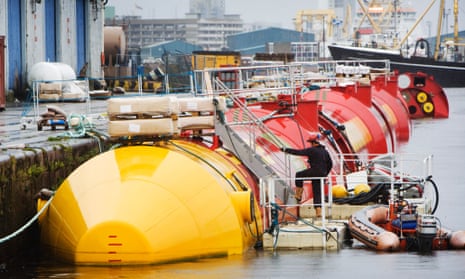The Scottish government has been accused of abandoning wave power after one leading company has been forced into administration and another has had to shed most of its staff.
Pelamis, developers of a floating offshore wave energy converter that looks like a large red sea snake, collapsed suddenly into administration on 21 November, with the subsequent loss of 40 jobs. Aquamarine, which is behind a yellow near-shore device known as Oyster, is making about 30 staff redundant.
The deadline for offers to buy Pelamis, which is based at Leith in Edinburgh, passed at 10.30 this morning. The administrator, KPMG, said there had been interest, but will not be giving further details for “some time”.
Both wave companies have complained about the difficulties of acquiring adequate funding. The job losses were “a consequence of the considerable financial, regulatory and technical challenges faced by the ocean energy sector as a whole,” according to Aquamarine’s chief executive, John Malcolm.
But now the Scottish Green Party has put the blame squarely on Scottish National Party ministers, whom they backed during the independence referendum. Ministers have previously been lauded for their commitment to renewable energy.
The Green MSP for Lothian, Alison Johnstone, has written to the Scottish energy minister, Fergus Ewing, accusing him of failing to do enough to back wave power. “Ministers need to reassess their priorities because they are abandoning wave, while leaving the door open to unwelcome energy developments such as fracking,” she said.
“Public funding clearly remains crucial at this stage to support the industry, so I’m calling on the Scottish government to use some of the millions it received last week from Westminster to support wave power jobs.”
Scottish ministers have sounded distinctly less enthusiastic about fracking for shale gas than Westminster, but they have not ruled it out. In the Chancellor George Osborne’s autumn budget last week Scotland was given £213m.
The day after Pelamis collapsed, the Scottish government announced it was setting up a new agency, Wave Energy Scotland. Ewing told the Scottish Parliament that it would employ some of those who were losing their jobs “to retain the best brains in Scotland”.
But Johnstone pointed out that a more detailed account of the new body now released showed that it was at a very early stage. “The new agency being promised by the government has no staff, no funding and no timescale as yet,” she said.
“It appears to be window dressing. Jobs and expertise risk being lost from Scotland while other countries advance on the technology.”
The industry body, Scottish Renewables, stressed that wave power needed private as well as public funding. “The Scottish government have been long-term supporters of wave energy and the creation of Wave Energy Scotland is an indication of their continued backing,” said senior policy manager, Lindsay Leask.
“While the details of how the organisation will work have yet to be clarified, we hope it will provide crucial support to the many home-grown Scottish companies who remain in the sector.”
A Scottish government spokesman said: “The Scottish government has given a commitment to wave energy that far exceeds any other government in Europe. Sadly, there is currently no prospect of further commercial investment in the two major wave energy companies in Scotland. We have therefore reached the full extent of public support possible for these companies, under the EU state aid framework and the rules for prudent public investment.
“Wave energy is a young industry and we still have a lot of learning to do in marine renewables. We have extraordinary ocean energy resources off Scotland’s coasts, our belief in the future success of wave energy is undiminished. This is why we have announced a bold new model of support for the development of wave power technology: Wave Energy Scotland.”

Comments (…)
Sign in or create your Guardian account to join the discussion